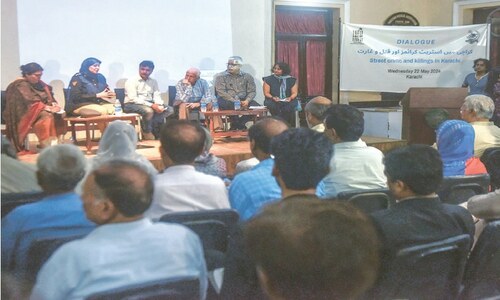KARACHI: Secretary general of the Human Rights Commission of Pakistan I.A. Rehman gave an insightful talk on ‘The Politics of Dissent in Pakistan’ on Saturday evening.
The lecture was organised in memory of the distinguished political and social worker and students’ leader Fatehyab Ali Khan at the Pakistan Institute of International Affairs library.
Mr Rehman explained that dissent implied presenting alternatives to state narratives. Alternatives to what, he asked, and answered that it was to do with the dominant narratives that developed because of a lack of clarity and interpretation of ideas before independence. When Mohammad Ali Jinnah was asked about the nature of Pakistani nationhood, the markers that he chose to define it came from religious traditions, which created a problem. He chose to define the history of Muslims of India different from their Hindu compatriots.
Regional communities (Bengalis, Punjabis, Sindhis, etc) were ignored as well as what was common and uncommon between them, he said. Still, Mr Jinnah maintained that Islamic principles would be followed in Pakistan but it would not be a theocracy. At the time of independence, he said, there were three groups who had their opinion on the matter and a large group of which supported sharia state. Realizing the danger of the issue, Mr Jinnah called for a new nationhood on the basis of citizenship but perhaps did not take his colleagues into confidence which was why his Aug 11 speech was not allowed to get published.
Mr Rehman said the price was paid in 1949 in the form of the Objectives Resolution and the country moved towards becoming a theocratic state.
He said Ayub Khan tried to apply the brakes but actually strengthened the clergy. In 1965 during the war with India, people’s religious sentiments were evoked not the love of the motherland, he argued. The Centre later gained more power, he added.
Mr Rehman then touched upon the issue of foreign policy. He said Mr Jinnah wanted foreign policy to be governed by the principles of friendship with all and malice to none which was discarded in his lifetime and the country entered into western military pacts in the early 1950s, turning into a security state. The element of permanent hostility towards India followed and with conflict over Kashmir the anti-India posture was maintained, resulting in a gradual transfer of power to the military, he said.
Mr Rehman said the politics of dissent began from the time of independence, to little avail. Ayub Khan had to restore the words ‘Islamic Republic’ into the country’s name, and the process to decide who’s Muslim who’s not took root. Mr Jinnah wanted non-Muslims to join the Muslim League; it didn’t happen and it became a Muslims-only party, he said. No one opposed the Objectives Resolution, and even Mian Iftikharuddin believed nobody’s going to follow it, until Gen Zia aggravated things. As a result, agitation was witnessed and women came out against the Hudood Ordinance.
Going back to independence, he said, it was Begum Shaista Ikramullah who first spoke for the Bengali linguistic right but was silenced and told it didn’t befit a woman to speak on such matters. Urdu contributed to another dimension to state ideology. Carrying on with his point, he briefly talked about the Awami League, Khan Abdul Ghaffar Khan and agitation in Balochistan.
Mr Rehman said it was in 1957 that alternatives began to emerge with the arrival of the National Awami Party on the scene, frightening the establishment as a result of which pacts were withdrawn. Things, however, didn’t change much and subsequently Ayub Khan experimented with partyless politics. The Awami League and the PPP challenged Ayub Khan a bit, but the military kept its control, he added.
According to the HRCP secretary general, the politics of dissent since 1977 had largely been confined to agitation for the restoration of democracy, and in the 1981 accord the objectives of the movement were spelled out. Yet democracy achieved little, Mr Rehman commented, adding that for the past 25 years opposition parties became indistinguishable from the parties in power.
He said the politics of dissent was not exclusive to political parties as the role played by poets, journalists, lawyers and students was no less significant. Poets, he said, had kept the fire of dissent alive and in that regard he took the names of Faiz, Sheikh Ayaz and Habib Jalib. He also lauded the part played by students’ organisation such as the Democratic Students Federation (DSF) that resisted state oppression and not just fought for the students’ community but for the people as a whole. Bar councils’ struggle was appreciated too as was journalists’ contribution to the whole situation. He claimed that journalists had the clearest voice against Gen Ayub Khan.
Reverting to students’ part he praised Fatehyab Ali Khan’s contribution to a great struggle and called him a star in the galaxy created by the National Students Federation (NSF). “He brought his zest of change into politics,” he remarked.
Mr Rehman said the politics of dissent did cause a rethinking on some matters such as land reforms, language issues (belatedly in the case of Bengali) and the involvement in the non-aligned movement. Also, today every politician was using the slogans that dissenters had used.
After the presentation, the floor was opened for a question-and-answer session.
Earlier, PIIA chairperson Dr Masooma Hasan introduced the speaker to the audience and briefly shed light on the achievements of the late Fatehyab Ali Khan, including his role in restoring the PIIA to its original position after Gen Zia tried to turn it into a government institution.
Published in Dawn January 25th , 2015
On a mobile phone? Get the Dawn Mobile App: Apple Store | Google Play















































Dear visitor, the comments section is undergoing an overhaul and will return soon.